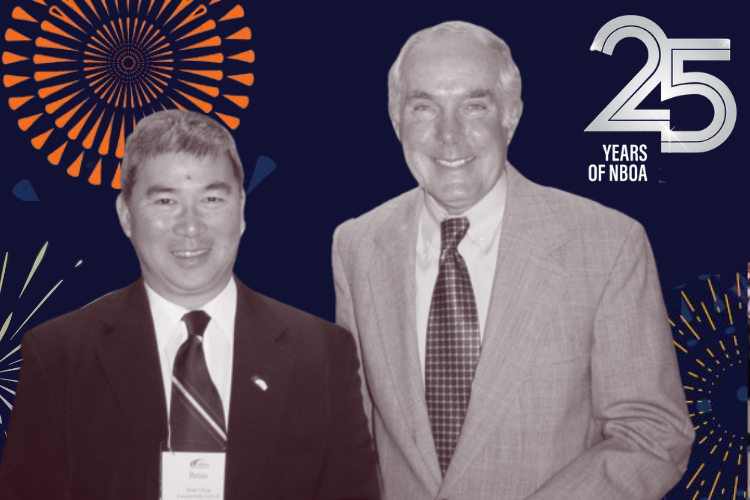In the beginning there was an idea. Then a list serv. And soon thereafter a newsletter, a website and a conference. But more important than any of those resources, there were independent school business officers who were ready and willing to share their expertise to a degree not seen in many other professional associations.
This is the second installment of "Celebrate! 25 Years of NBOA," the story of how NBOA came to be, how it’s evolved over 25 years, and where it is going in the next 25 years. Read the previous excerpt, "Celebrate! 25 Years of NBOA: Origin Story" here.
Who Was at the Table?
To be frank, women and racial minorities were few and far between in the early days of NBOA. But those who were involved felt welcomed by all reports.

Founding business officer Brian Chang, who was the business officer at Kamehameha Schools in Hawaii, joined because Hancock sold him on the opportunity. Chang’s job, however, was very different from most other business officers’ due to the unique nature of his school, which operates like a large corporation rather than a typical independent school. Founded to support students with native Hawaiian ancestry, Kamehameha is supported by a large endowment and requires a staff of hundreds. Therefore, Chang’s issues didn’t always overlap with others, but “It was eye-opening to be able to share our rich history with other business officers when I attended conferences,” he said. “I felt very welcomed,” he added. And he did take away a few things — for example, he convinced Kamehameha’s large billing department to use tuition management software in alignment with best business practices.
NBOA has had one Board Chair of color, Dallas Joseph. “Being the first is an honor,” he said. “It comes with a lot of expectations and a lot of pressure. But I do think that in my time at NBOA we’ve seen more CFOs of color in the association and in independent schools.” He too felt welcomed: “Those contacts from 23 years ago embraced me, invited me to the meetings that I needed to attend. They invited me to participate in building the organization so that it could be the organization that it is today.” And today he gives back: “I feel fortunate to be in the position of having been recognized at the highest level, so that now I have some influence to be able to help others, and possibly help them become a board chair one day.”
All the founding women business officers had been mentored earlier in their careers by male counterparts as well as other women — business officers who were happy to bring their female colleagues along, she explained.
In terms of gender balance, “There were just a few of us who were women in the beginning,” explained former NBOA Board Chair Kate Lindsey. Of the 23 founding business officers, just five were women, and Sarah Daignault in her executive director role would count as a sixth. “The irony was, we’re definitely not shrinking violets. So it really didn’t dawn on us that we were so few in number and the only women,” she continued. All the founding women business officers had been mentored earlier in their careers by male counterparts as well as other women — business officers who were happy to bring their female colleagues along, she explained.
Founding business officer Dee Forgette noted that when she joined the field, there were plenty of women in the business office, but typically they’d be at smaller schools and playing smaller roles. The larger, more resourced schools almost all had male business officers. “That changed a lot over time. And we always actually worked hard to change that.” While the industry and association with it has made significant strides in terms of women’s involvement, as about half of all business office staff are women, women are still paid less on average than male counterparts, in line with the national pay gap, according to NBOA’s “Demographics of the Independent School Business Office: Key Research Findings,” released in 2020. Racial minorities make up just 16% of business office staff. We have grown but we have work ahead of still.

Eyes on Diversity, Equity and Inclusion
In February 2020 at the NBOA Annual Meeting in Orlando, former NBOA Board Chair Chuck McCullagh announced that the NBOA Board of Directors had formally published the association’s Commitment to Diversity, Equity and Inclusion. The statement came after over a year of work to define what diversity, equity and inclusion means to our association, and to determine the association’s role in explicitly demonstrating our commitment to these essential perspectives and actions.
Former NBOA Board Chair Tracey Fudge was instrumental in launching efforts to develop NBOA’s DEI statement. “There was a real need for us as the Board of an organization serving school leaders to step forward and say that our association is not only open to diversity, but embraces and creates a safe space for all individuals,” she said. “To be equitable and to fully realize the potential of our community, we need to actively seek to include diverse representation and create policies and procedures to ensure that individuals feel safe and have a sense of belonging in our community. Board leadership must establish those practices and policies.With formalized attention to diversity, equity, inclusion and belonging at the governance level, NBOA will attract, develop, support, and retain strong leaders who bring depth and breadth of experience and perspective, not only to the association but also to their school communities,” Fudge explained.
It’s also important to note that the statement is a starting point: In the years since, NBOA has worked to expand online and in-person educational programming around this topic. This has included selection of NBOA Annual Meeting keynote speakers, sessions and deep dives in addition to webinars and workshops. And in 2022, Net Assets launched an ongoing series on “The Business Case for DEI,” covering areas ranging from cultural competency trainings to economic diversity to digital accessibility standards and more. While there is much more to do to expand access and inclusion for community members, it’s important to take a moment to celebrate small steps toward inclusion.
“When I took my first CFO role in 2015, I was the only Black person at the school. I also didn’t know anyone from the community coming in. Add onto that the newness of the role and the fear of messing up, those first years were really challenging. I felt like the outside kid in a very close-knit school community, whom I thankfully grew to know and love."
Chris Harper, The Landon School
Chris Harper became CFO/COO at The Landon School in Bethesda, Maryland, in 2021. But his experience in independent schools began much earlier, in 1977, as a student at University of Chicago Lab Schools (UCLS). And since 2004, Harper has worked in independent school management as a faculty member, testing coordinator, enrollment specialist, cross country and track coach, to name a few of his roles, while earning his MBA at Northwestern University’s Kellogg School of Management. To put it simply, Harper is a “lifer” of independent schools and an evangelist of their offerings. He has also witnessed firsthand how the industry has evolved in terms of racial diversity and inclusion.
“When I took my first CFO role in 2015, I was the only Black person at the school. I also didn’t know anyone from the community coming in. Add onto that the newness of the role and the fear of messing up, those first years were really challenging.
I felt like the outside kid in a very close-knit school community, whom I thankfully grew to know and love,” said Harper. “Flash forward to today, and there are still so few Black male CFOs in independent schools. That drives me to become even more visible, more aspirational. I want to be that resource to other leaders in the business office.”
Despite these challenges, Harper says he is hopeful that the business office will continue to become more racially diverse and that independent schools can be an inclusive place for business professionals from any background. “I’ve found my place. I love this role, and I love the community I get to serve.”
Of course, race is just one aspect of diversity, equity and inclusion efforts. Hoyle reflected on his experience as a gay man in an independent school: “A challenge I encounter is that I continually have to keep outing myself. Because when you’re new to an organization and just introducing yourself, people tend to jump to conclusions. I mention I have a son, and people ask about my wife. So I have to say, ‘Well, let me tell you about my partner.’ It can be tiring to have to explain again and again, but people in schools tend to be very welcoming,” said Hoyle.



.png?sfvrsn=a0b06f90_1)

